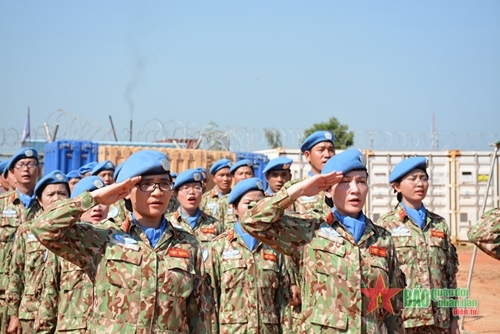According to a latest report by the Ministry of Labor, Invalids and Social Affairs, for the past one decade, the national goals on gender equality in Vietnam have been realized synchronously, creating a change in the awareness of and actions in gender equality implementation of party committees and authorities at all levels, and of cadres, civil servants, and people.
Also the system of legal documents and policies has been gradually improved towards ensuring the principle of gender equality and in line with international standards. The mainstreaming of gender in making and implementing policies, laws, programs, plans, and projects has received due attention from all levels and departments, thereby narrowing the gender gap, raising the role and position of women in family and society. The mainstreaming of gender has also created engagement chances for both women and men and brought equal benefits for them in all fields of political, economic, and social life.
    |
 |
|
Vietnamese officers taking on duties at the U.N. Mission in South Sudan |
Especially, remarkable progress has been seen in the results of implementing the national goals on gender equality in all fields.
During this period, for the first time, women have held a number of important positions in the Party, State and legislative bodies. In particular, the elections of deputies to the 15th National Assembly (N.A.) and people's councils at all levels for the 2021-2026 periods was successfully organized with female N.A. deputies making up 30.26% (the highest rate since the fifth N.A.) and women joining the all-level people’s councils account for nearly 30%. In addition, women have also engaged more in economic activities and had more opportunities to get good jobs with higher incomes. This has importantly contributed to helping Vietnam maintain the highest economic growth rate in the world over the past decade despite political and economic fluctuations in the region and the world.
Attentively, a number of improved development indicators have moved Vietnam to higher ranks and are highly appreciated by the international community for its efforts in gender equality realization. According to the Human Development Report 2020, Vietnam's human development index (HDI) is at 0.704, placing 117th out of 189 countries and territories in the group of countries with high HDI. With the gender development index at 0.997, Vietnam is also ranked 65th out of 162 countries and among the highest of the five groups in the world. Notably, the percentage of female N.A. deputies in Vietnam is in the highest of the three groups globally.
It can be said that these efforts and outcomes are testament to Vietnam's strong determination in promoting gender equality and advancement of women with a clear strategy consistent with national reality.
Apart from the aforementioned achievements, some difficulties, challenges and limitations in gender equality promotion in Vietnam still exist. For instance, women have not had full access to and participation in the majority of technology-related jobs. This has reflected inequalities in choices and careers in science, technology, engineering, and math. On the other hand, automation technology has increased production efficiency and reduced employment positions in which many have been taken by women.
The Ministry of Labor, Invalids and Social Affairs’ report has also outlined a number of key tasks and solutions to gender equality promotion in Vietnam in the time ahead. First, it needs to continue to strengthen the leadership and direction of all level Party committees, management responsibility of all level authorities in raising awareness, implementing and perfecting institutions on gender equality. Second, the capacity of all-level state management apparatus on gender equality should be strengthened. Third, the interdisciplinary inspection and examination on law enforcement should be enhanced as well. Fourth, it is necessary to build a database on national gender. In addition, proactive enhancement in international cooperation in the implementation of gender equality goals, and taking advantage of the technical, financial and professional support of foreign countries, organizations and individuals in this field are also needed.
Another important duty is to continue to disseminate information about laws, policies and achievements on gender equality in Vietnam to international partners; and at the same time actively fight against false information about gender equality and other policies issued by the Party and State of Vietnam.
Translated by Mai Huong